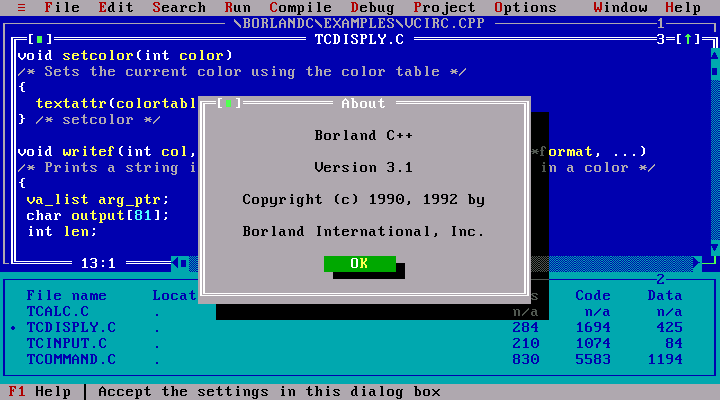I REALLY hate articles like this
Saying we “lost” this software just shows that people don’t understand what software design/engineering is.
Basically every screenshot of the “lost” TUIs look like a normal emacs/vim session for anyone who has learned about splits and
:term(guess which god I believe in?). And people still use those near constantly. Hell, my workflow is generally a mix between vim and vscode depending upon what machine and operation I am working on. And that is a very normal workflow.And that is what we want out of software development. The good ideas move forward. The less good ideas become plugins for sickos. Because everyone loves vscode right now but… Microsoft is shitting that up REAL fast with copilot and just wait until every employer on the planet realizes that and ban it.
And the rest just ignores the point of an IDE. Yes, taking your hand off the keyboard to touch the mouse LOWERS YOUR EFFICIENCY*. But it also means you can switch between languages or even environments trivially. Yes, it is often more annoying to dig through twelve menus to find what you want or talk a co-worker through how to do basic git operations that would be three commands. But holy crap I hate the people who “can’t work without my settings” that mean they are incapable of doing any “live” debugging or doing any peer programming where they aren’t driving.
Back in the day we had plenty of people who were angry that not everyone was using vi and a bunch of tcsh scripts to develop because it clearly meant they didn’t understand what they were doing and were too dependent on compilers and debuggers. And it was just as stupid then as it is now.
Basically every screenshot of the “lost” TUIs look like a normal emacs/vim session for anyone who has learned about splits and
:term(guess which god I believe in?). And people still use those near constantly. Hell, my workflow is generally a mix between vim and vscode depending upon what machine and operation I am working on. And that is a very normal workflow.I use emacs, and kind of had the same gut reaction, but they do address it and have a valid point in that the IDEs they’re talking about are “out of box” set up and require little learning to use in that mode.
Like, you can use emacs and I’m sure vim as an IDE, but what you have is more a toolkit of parts for putting together your own IDE. That can be really nice, more flexible, but it’s also true that it isn’t an off-the-shelf, low-effort-to-pick-up solution.
Emacs had some “premade IDE” project I recall that I tried and wasn’t that enthusiastic about.
I don’t know vim enough to know what all the parts are. Nerdtree for file browsing? I dunno.
With emacs, I use magit as a git frontend, a compilation buffer to jump to errors, projectile to know the project build command and auto-identify the build system used for a given project and search through project files, dired to browse the files, etags and some language server – think things have changed recently, but I haven’t been coding recently – to jump around the codebase. I have color syntax highlighting set up. I use .dir-locals.el to store per-project settings like that build command used by projectile. The gdb frontend to traverse code associated with lines in a stack trace on a running program. TRAMP to edit files on remote machines.
But that stuff isn’t generally set up or obvious out of box. It takes time to learn.
EDIT: The “premade IDE” I was thinking of for emacs is eide:
I was using emacs then, I’m using emacs now, and I’ll be using emacs in another 30 years.
You might not like it, but Borland yellow on blue was peak IDE design.

Personally, I have downloaded Borland themes for all my IDEs. I don’t use them, of course, because I’m not entirely insane and I value my eyesight too much, but I have downloaded them.
I was developing 30 years ago and I love what’s available today. Nostalgia is fine, as far as it goes, but things change and sometimes for the better. This is one of those cases.





